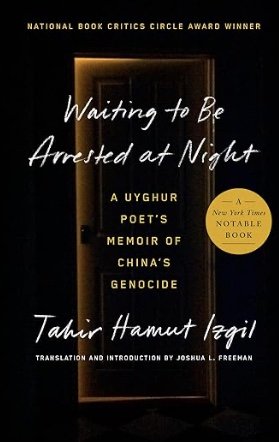Waiting to be Arrested at Night by Tahir Hamut Izgil, translated by Joshua L. Freeman (Penguin Press)
“No wall can stop the wind,” a Uyghur proverb says and Tahir Hamut Izgil knows this is true. In 1996, he is imprisoned for three years when Chinese authorities stop him as he leaves his home in Xinjiang to study in Turkey. Accused of “taking illegal and confidential materials out of the country,” this young poet has to rebuild his life when he‘s released just before the turn of the century.
He marries and makes a comfortable and secure living for his wife and two daughters as a film director for movies, television shows, and commercials. But his true vocation lies in writing poetry. Over the next twelve years, he nurtures this gift within a network of Uyghur writers.
Uyghur people have lived in the Xinjiang Uyghur Autonomous Region for millennia, perhaps before the beginning of the Christian Era. Followers of Islam with presumably Turkish origins, most of them live in the capital city of Urumqi, as does Izgil. In recent years, the Chinese government has accused them of plotting separatism and when a spurt of violence erupts in Urumqi in 2009, the clampdown upon this ethnic group is swift and draconian.
Mass arrests become routine, with Uyghurs accused of “fabricated crimes” and whisked away to re-education centers. Izgil is taken into police custody, extensively interrogated, and put under surveillance.
In 2011, the government bans traditional Arabic greetings and orders people to change their names from those that have Islamic origins. The Chinese flag is raised over mosques. Radios are confiscated and banned from sale. Inspections of mobile phones routinely end in the arrest of the people who own them.
Izgil and his wife are called into police headquarters for fingerprinting, an ordeal that lasts three hours and includes taking blood samples, ‘voice prints,” and facial images. When asked about his religious faith, Izgil says he has none. When they’re finally released, Izgil’s wife, who has resisted any thought of immigration, says “We have to leave the country.”
They give away their copies of the Quran, they purge their phones and computers of anything that might be compromising, and they embark on a torturous, convoluted path that will lead them from their homeland. After a Uyghur academic is given life imprisonment under accusations of separatism, Izgil keeps warm clothing and thick footwear by his bedside in case the police come to take him away in the middle of the night.
“I wish China would just conquer the world,” one of Izgil’s friends says bitterly, “Then we would all be the same…not alone in our suffering.” Another says in a poem, “We came from nowhere else and we will not leave for anywhere.” Not long after Izgil and his family emigrate to the United States, this man is sentenced to 16 years in prison.
Once they are safely in another country, Izgil calls his parents but not even this message of reassurance goes unpunished. Soon after this, his mother’s phone and ID card are both confiscated.
As they make another home in a strange place, “we burn with guilt,” Izgil admits, “Our bodies might still be here but our souls are still back home.”
Although this memoir is eloquent and illuminating, its narrative is told under a different timescape, twisting with personal history, conversations that are scrupulously detailed, and a wealth of poems. Reading it gives not just another perspective but a whole new form of psychology, one that was constructed to survive a world that could well have been invented by Kafka, one that readers are privileged to experience at a comfortable distance.~Janet Brown
